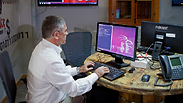
Cyber warfare is only one of the issues Israel will have to deal with in the future
צילום: AP
Israel's security problems require unique solutions – and a lot of money
Analysis: A deep understanding of our strategic situation in the Middle East obligates us to look to the future: What kind of surprises will the enemy have in store for us in the next round?
The current round, Operation Protective Edge, has come to an end, and the "battle" over the defense budget is now beginning. This battle is waged every summer, every year.
Last year, I published an article about the defense budget with a title pointing to its content: A clear, concrete danger. I explained that the IDF was bigger (both in manpower and in weapons – planes, tanks, cannons, etc) than the British or French or German armies, while the Israeli defense budget was four to five times lower than the defense budget of each of these countries. So where is the army's "fat" hiding?
The public debate over the defense budget is usually based on lack of knowledge of the figures. Everyone is preoccupied with the pension of those who retire from the defense establishment, but few know that the state spends double the amount on the pension of civil servants who don't belong to the IDF or to the police.
And what about the budget? According to the Central Bureau of Statistics' latest annual report, the State of Israel spent about 12.8% of its gross domestic product in 2013 on education and culture, 7.6% on health and 5.2% on defense. True, we all want the spending on education and health to grow, but what can we do? Israel is facing real threats which occasionally claim a heavy price from us, like more than 70 dead Israelis in Operation Protective Edge.
Under fire, proportions change. Some $50,000 for one Iron Dome interception missile or $500,000 to defend four fighters in a tank (the Active Trophy system) suddenly seem justified. It's good that there was someone who thought, invested and built the responses to the rocket and antitank missile threats in advance.
But a deep understanding of our strategic situation in the Middle East obligates us to look to the future: What kind of surprises will the enemy have in store for us in the next round? It's safe to assume that there is already someone on the other side who is drawing lessons from the recent operation and trying to find new breaches instead of the ones sealed by systems like the Iron Dome and others.
Hints of what we should expect in the future have already been sent to us in this round. One of them is cyber warfare, on two different levels: First, taking advantage of social networks and modern computerized media to increase the effect of terrorism (look at what is happening with ISIS' YouTube clips); and second, infiltrating the computer and media networks in order to disrupt vital systems.
The entire world is debating whether the smuggling and supply of weapons (rockets, missiles, etc) to terror organizations can be prevented. But no one has a doubt that the transfer of cyber weapons to terrorists is almost unstoppable.
The cyber attacks we experienced during the operation did not cause any real damage, but the experience we have gained in this area is priceless. This is one of the reasons why thousands of people and huge delegations from nearly 38 countries have already registered for the International Cybersecurity Conference, which will be held next week by the Interdisciplinary Cyber Research Center at Tel Aviv University.
But cyber is not all. During the current round, Hamas already realized that the long-term rockets were ineffective and focused on firing short-range mortar shells on the Gaza vicinity communities and the IDF's assembly areas. Who can invent a good solution to this problem? And what is that solution? And what about the possibility of using more accurate weapons?
There is no need to mention that some of our security problems are unique and that their solutions cannot be bought elsewhere.
The security research and development system must deal with these issues and with tougher ones, which I cannot elaborate on here. Following Operation Protective Edge, it's clear that we must develop unique technologies for ourselves. This requires a combination of many factors: Creativity, professional manpower, a reasonable choice between alternative, a high level of science and technology, intelligence, proper organization, etc. That also requires money. A lot of money.
Major-General (res.) Prof. Isaac Ben-Israel is the chairman of the Israel Space Agency and head of the Interdisciplinary Cyber Research Center at Tel Aviv University.










